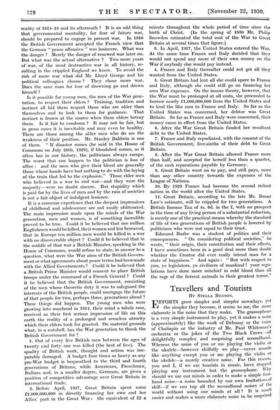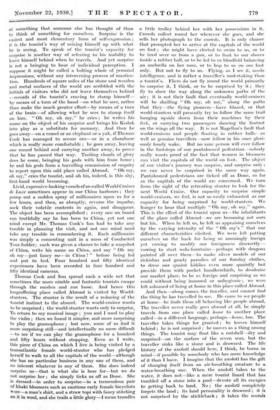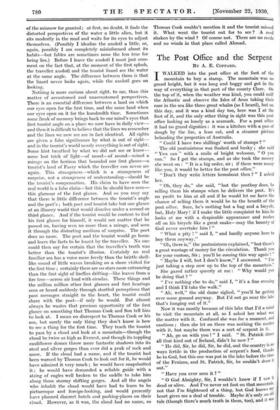Travellers and Tourists
BY STELLA BENSON.
EFFORTS grow simpler and simpler nowadays, yet the simpler they become, it seems to me,, the more elaborate is the noise that they make. The gramophone is a very simple instrument to play, yet it makes a noise (approximately) like the work of Debussy or the voice of Chaliapin or the industry of Mr. Paul Whiteman's orchestra or the jokes of the Two Black Crows—all delightfully complei and surprising and secondhand. Whereas the noise of you or me playing the violin or the ukulele—hoWever skilfully we play—never sounds like anything except you Or me playing the- violin or the ukelele—a merely creative noise. For *this reason, you and I, if we are tourists in music, have stopped playing any instrument but the gramophone. Why should we use our minds in order to make a simple first- hand noise—a noise bounded by our own limitations of skill—if we can tap all the secondhand noises of the world without using our minds at all ? It is much easier and makes a more elaborate noise to be surprised
at something that someone else has thought of than to think of something for ourselves. Surprise is the easiest and most elementary form of self-expression ; it is the tourist's way of mixing himself up with what he is seeing. To speak of the tourist's capacity for surprise is another way of referring to his inability to leave himself behind when he travels. And yet surprise is not a bringing to bear of individual perception. I suppose it might be called a bolting whole of personal impressions, without any intervening process of mastica- tion. Hundreds of square miles of the stone and wooden and metal surfaces of the world are scribbled with the initials of visitors who did not leave themselves behind —records of the tourist's craving to stamp himself— by means of a turn of the hand—on what he sees, rather than make the much greater effort—by means of a turn of the brain—of allowing what he sees to stamp itself on him. " Oh my, oh my," he cries ; he writes his name on the object of his surprige and brings his Kodak into play as a substitute for memory. And then he goes away—on a camel or an elephant or a yak, if Thomas Cook has managed to secure one—or in a charabanc which is really more comfortable ; he goes away, leaving one record behind and carrying another away, to prove that he has passed that way. Trailing clouds of glory does he come, bringing his gods with him from home ; he and his gods form a travelling commission of enquiry to report upon this odd place called Abroad. " Oh my, oh my," cries the tourist, and oh his, indeed, is this shy, first-hand world becoming.
Livid, expensive-looking vessels of so-called World Cruises de Luxe sometimes appear in our China harbours ; they pump out a sudden spray of millionaires upon us for a few hours, and then, as abruptly, reverse the impulse, suck their volatile contents in again, and disappear. The object has been accomplished ; every one on board can truthfully say he has been to China,' yet not one mind except Mr. Thomas Cook's has had to take any trouble in planning the visit, and not one mind need take any trouble in remembering it. Each millionaire was simply a consenting unit in a mass of Conducted Tour-fodder; each was given a chance to take a snapshot of China, write his name on China, and say " Oh my oh my—just fancy me—in China!" before being fed and put to bed. Four hundred and fifty identical experiences have been recorded in four hundred and fifty identical cameras.
Thomas Cook and Son spread such a wide net that sometimes the more nimble and fantastic tourists escape through the meshes and run loose. And hence this longsuffering place called Abroad is visited by World- stunters. The stunter is the result of a reducing of the tourist instinct to the absurd. The world-cruiser wants to be surprised ; the world-stunter wants only to surprise, To return to my musical image ; you and r used to' play the violin ; then we found it simpler, and more surprising to play the gramophone ; but now, some of us find it more surprising still—and intellectually no more difficult —to see if we can play the gramophone for a hundred and fifty hours without stopping. Even as I write, this piece of China on which I live is being visited by a transatlantic female world-stunter who has pledged herself to walk to all the capitals of the world—although she has no particular business in any one of them, and no interest whatever in any of them. She does indeed surprise us—that is what she is here for—but we do not surprise her ; she simply ticks us off as Done. She is dressed—in order to surprise—in a tremendous pair of khaki bloomers such as cautious early female bicyclists wore—a man's shirt, and a straw topi with fancy stitching on it in wool, and she trails a little glory—I mean trundles
a little trolley behind her with her possessions in it. Crowds collect round her wherever she goes, and she sells her photograph to the crowds. It is only chance that prompted her to arrive at the capitals of the world on foot ; she might have elected to swim to us, or to be fired over us from a gun, or to float to our shores inside a rubber ball, or to be led to us blindfold balancing an umbrella on her nose, or to hop to us on one foot only. But not to fly to us. Flying, as I see it, needs intelligence, and is rather a traveller's undertaking than a tourist's. Fliers do not fly round the world primarily to surprise it, I think, or to be surprised by it ; they fly to show the way along the unknown paths of the air ; it is not their fault that eventually world-cruisers will be shrilling " Oh my, oh my," along the paths that they—the flying pioneers—have blazed, or that world-stunters will presently try to follow the same trail hanging upside down from their machines by their feet, or carrying two passengers dancing the foxtrot on the wings all the way. It is not Magellan's fault that world-cruisers and people floating in rubber balls—as well as genuine travellers—now follow in his once glori- ously lonely wake. But no sane person will ever follow in the footsteps of our pantalooncd pedestrian—nobody really wants proof of the fact that women in bloomers can visit the capitals of the world on foot. The object of our visitor's journey was surprise, and surprise only ; we can never be surprised in the same way again. Pantalooned pedestrians are ticked off as Done, so far as the capitals of the world are concerned. We turn from the sight of the retreating stunter to look for the next World Cruise. Our capacity to surprise simple world-cruisers, we feel, is not so easily exhausted as our capacity for being surprised by world-stunters. We hunger to hear that multiple " Oh my, oh my," again. This is the effect of the tourist upon us—the inhabitants of the place called Abroad—we are becoming not ours but his. When he left us, he left us appraising ourselves by the varying intensity of the " Oh my's " that our different characteristics elicited. We were left patting ourselves on the back for being so amusingly foreign yet vowing to modify our foreignness discreetly— vowing to start soda-fountains—perhaps with dragons painted all over them—to make silver models of our rickishas and gaudy parodies of our Sunday clothes, to dress our quaint kiddies even more quaintly but provide them with pocket handkerchiefs, to deodorise our market place, to be as foreign and surprising as we could without being immoral or unhygienic ; we were left ashamed of being at home in this place called Abroad.
And then—along comes the traveller, and cannot find the thing he has travelled to see. He came to see people at home—he finds them all behaving like people abroad. The traveller never really goes abroad at all, he simply travels from one place called home to another place called—in a different language, perhaps--home, too. The traveller takes things for granted ; he leaves himself behind ; he is not surprised ; he moves as a thing among things. The tourist may float like a nutshell—dry and surprised—on the surface of the seven seas, but the traveller sinks like a stone and is drowned. The life history of the axolotl should here, I think, be borne in mind—if possible by somebody who has more knowledge of it than I have. I imagine that the axolotl has the gift of changing itself from an air-breathing creature to a water-breathing one. When the axolotl takes to the water, it does not—like a mere tourist lizard that has tumbled off a stone into a pool—devote all its energies to getting back to land. No ; the axolotl completely forgets the land ; its land personality is drowned ; it is not surprised by the stickleback ; it takes the morals of the minnow for granted; at first, no doubt, it finds the distorted perspectives of the water a little alien, but it sits modestly in the mud and waits for its eyes to adjust themselves. (Possibly I idealize the axolotl a little, or, again, possibly I am completely misinformed about its habits—but fables are sometimes none the less true for being lies.) Before I leave the axolotl I must just com- ment on the fact that, at the moment of the first splash, the traveller axolotl and the tourist lizard see the water at the same angle. The difference between them is that the lizard never looks again, while the axolotl goes on looking.
Nothing is more curious about sight, to me, than this matter of accustomed and unaccustomed perspectives. There is an essential difference between a land on which our eyes open for the first time, and the same land when our eyes open on it for the hundredth time. Sometimes some freak of memory brings back to our mind's eyes that first tourist angle on a place we now have in daily view— and then it is difficult to believe that the lines we remember and the lines we now see are in fact identical. All sights are given a false significance by what is out of sight— and in the tourist's world nearly everything is out of sight. Some hint breathed by what we did not see or know— some lost trick of light—of mood—of sound—raised a mirage on the horizon that bounded our first glance—a tourist's land of Faery which the traveller can never see again. This strangeness—which is a strangeness of surprise, not a strangeness of understanding—should be the tourist's compensation. His claim to have seen the real world is a false claim—but this he should have seen— this glamour of the first glance. And so you may say that there is little difference between the tourist's angle and the poet's ; both poet and tourist take but one glance at an illusory world that would dissolve under a second or third glance. And if the tourist would be content to find his first glance for himself, it would not matter that he passed on, having seen no more than a mirage, and seen it through the distorting medium of surprise. The poet does no more. The poet and the tourist would go home and leave the facts to be learnt by the traveller. No one could then say for certain that the traveller's truth was better than the tourist's illusion. Certainly no real familiar sea has a voice more lovely than the brittle shell- like sound of little waves breaking on a shore visited for the first time ; certainly there are no stars more entrancing than the first sight of fireflies drifting—like leaves from a fire tree—across air loud with cicadas. These things and the million million other first glances and first hearings seen or heard suddenly through startled perceptions that pass messages straight to the heart, the tourist could share with the poet—if only he would. But almost always he wastes that precious opportunity of the first glance on something that Thomas Cook and Son tell him to look at. I mean no disrespect to Thomas Cook or his son, but surely the only thing they don't know is how to see a thing for the first time. They teach the tourist to pass by a cloud and look at a mountain—though the cloud be twice as high as Everest, and though its toppling cauliflower domes throw more fantastic shadows into its steel and silver gorges than ever did a peak of rock and snow. If the cloud had a name, and if the tourist had been warned by Thomas Cook to look out for it, he would have admired it very much ; he would have snapshotted it ; he would have demanded a reliable guide with a string of eagles well broken to the saddle to take him along those stormy shifting gorges. And all the angels who inhabit the cloud would have had to learn to be picturesque and foreign-looking, and would presently have planned discreet hotels and parking-places on their cloud. However, as it was, the cloud had no name, so
Thomas Cook couldn't mention it and the tourist missed it. What went the tourist out for to see ? A reed shaken by the wind ? Of course not. There are no reeds and no winds in that place called Abroad.




















































































 Previous page
Previous page